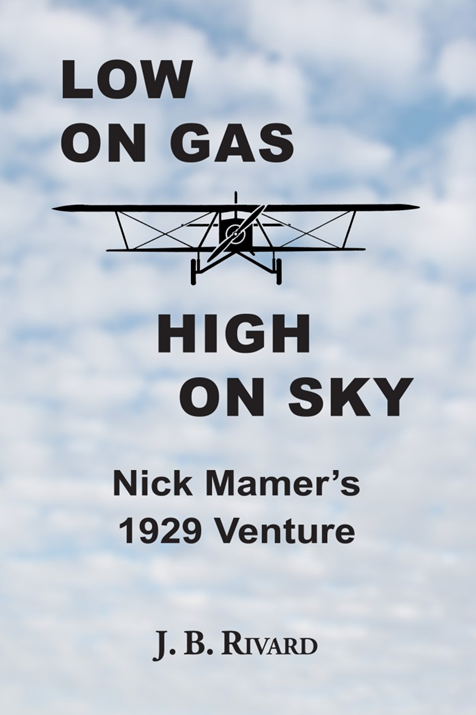Illusions of Magic Blog
Blog
Personal Note from J.B.
The blog is delayed this time because of our move from Spokane, Washington to Mesa, Arizona. Nevertheless, we are back with vigor and (I hope) vitality!
Below you’ll find how I learned of another of America’s early aviators, a name worth remembering. It was a memorable introduction. It’s titled “Walter E. Lees, Early Aviator.”
Also below is a summary of the book awards earned by my 2019 book Low on Gas – High on Sky. It’s “Low on Gas – High on Sky is a Winner.”
Finally, it’s my pleasure to introduce a new feature to the blog. Below you can read the first chapter of my serial novel, Dangerous Parallel. It’s a fictional adventure I hope you will enjoy. New chapters of the novel will appear in each of the following blogs.
I hope you like the blog. Please take time to comment, about the website, the blog, or other topic. (Be sure to tell me who it’s from.) Simply send an email to: feedback@illusionsofmagic.com.
Walter E. Lees, Early Aviator
I learned about Walter Lees during an unusual encounter.
Anya and I were standing behind a book display, selling copies of my Low on Gas – High on Sky book, which features the 1929 flight of pilot Nick Mamer. A fellow approached and asked if I knew of another early pilot named Walter Lees. I said I was not familiar with Lees. This prompted an explanation:
“Walter Lees is one of the earliest pilots, and I’m his grandson,” he said. He went on to say Orville Wright had signed Walter Lees’ pilot’s license, and that his aunt, Lees’ youngest daughter Jo, had written Pioneer Pilot, a book about her father’s life.

(Courtesy, Jo Cooper’s Book)
It turned out that the man I’d just met, Walter Lyn Watson, was also named after his grandfather, Walter E. Lees (1887-1957).
Thanks to Watson’s generosity and that of a mutual friend, I later received a copy of Pioneer Pilot. The book, published in 1993, was painstakingly created by Jo Cooper (Marilyn Josephine Lees Cooper, 1929-2007) based on her father’s handwritten notes. Cooper had earlier written numerous freelance nonfiction articles for magazines.
According to Cooper’s second husband, Ralph S. Cooper, the writing of the book “dominated her life” over a 20-year period. He said she was glad she’d written it, but “would never attempt such a major project again.”
Many of Lees’ quotes in the book were transcribed directly from Lees’ journals. In a note, Cooper apologizes for her interpretations of her father’s handwriting, saying it was “sometimes illegible.” With the help of Lees’ wife, (Loa Lloyd Lees) and some aviation experts, she however “deciphered” his writings and integrated them into the biographical narrative. Cooper explains that the book is also based on newspaper clippings, articles, and “taped interviews with people still living who knew him [Lees].”
Walter E. Lees is honored as one of the few Early Birds, a group of pilots restricted to those who began flying prior to Dec 17, 1916. He is best remembered, with copilot Frederic A. Brossy, for breaking the World Endurance Record for Non-refueled Aircraft. This occurred at Jacksonville Beach, Florida in 1931. The two men flew a Bellanca airplane equipped with a Packard 225 HP diesel radial engine for 84 hours 32 minutes. This record remained unbroken for the following 55 years.
Low on Gas – High on Sky is a Winner
 This past publishing season has seen Low on Gas – High on Sky become recognized as a top-notch book on the record-setting 1929 flight of the Spokane Sun God and the life of its lead pilot, Nick Mamer. The book was selected by three independent, national competitions:
This past publishing season has seen Low on Gas – High on Sky become recognized as a top-notch book on the record-setting 1929 flight of the Spokane Sun God and the life of its lead pilot, Nick Mamer. The book was selected by three independent, national competitions:
In October, the book was named a finalist in the IAN Book of the Year Awards in the nonfiction History category.
Then in November, the book became a finalist in the American Book Fest Best Book Awards of 2019, also in History.
In March of this year, Reader Views Literary Awards for 2019-2020 awarded the book Second Place in the History category. This prize is known as the Readers’ Choice Award.
To all the officials and judges who read and selected my book for recognition, thank-you. It was a great adventure researching and writing it. The book has been enthusiastically greeted by both the aviation community and general readers as a significant contribution to the history of aviation in America.



The book also resulted in official proclamations by the Mayors of Spokane, Washington and Spokane Valley naming August 15-20, 2019—the 90th anniversary of the famous flight—as Nick Mamer Days.
If you read the book and wish to comment, please post a review on the Low on Gas – High on Sky site on Amazon.com or Goodreads.com.
Dangerous Parallel
CHAPTER 1.
The dock was deserted. Everything was quiet, except for the soft clanking of sailboat shrouds in the marina across the harbor.
It was moonless and half past eleven when I climbed over the stern of Reel Time. I clambered up on the flying bridge and fumbled at the controls until I found the generator switch. With the generator rumbling, I hit the lights. The quartz lamps above the flying bridge blasted two white holes in the night. Squinting against the blinding dazzle of all that white fiberglass, I swung myself down onto the rear deck.
I stood there as the thirty-five footer sloshed a bit against her lines. The tide was out. Shark, I reminded myself—I’ve got to rig for shark. I pawed through the tackle drawers searching for the heaviest wire leaders. My jaw stretched around a giant yawn—the two hours I’d slept since hitting the bed early just weren’t enough.
Time for a Pepsi. Earlier, I’d chunked the small cooler of drinks onboard. I dug around in it, popped a can top and guzzled the fizzy. My body seemed almost alive.
I laid leaders out on the deck. Damned Arnie. He’s going to shut Zack and me down if he doesn’t get his money. Arnie Maddick is Reel Time’s absent owner. He pays no attention to maintaining the craft unless it is to wheedle someone into fixing a broken part on it without getting paid. He and Zack are on speaking terms, barely. And, speaking of the captain who knows no equal, where the hell is Zack?
Reel Time is a Bertram Sport Fishing yacht. One of those you charter for a chance at hooking a big billfish, or if you crave danger, shark. I started working it for Zack Montrose three years ago, after his divorce. Zack’s tall and rangy, salt and pepper hair, big ego. He and I hit it off right from the start, even though he’s a couple years older than me. Of course it didn’t hurt that we shared a generous dislike for Arnie.
The Pepsi tasted good. I swatted a big mosquito on my arm and climbed back onto the dock. After loading the fish boxes, I hauled four bags of ice and our frozen baitfish to the boat. I began tying leaders to the line on each of the fish rods. Exciting stuff, this life as a deck hand.
Headlights swung through the parking lot darkness. Then footsteps hit the wood of the dock. It was Zack.
“Goddamned mosquitos are dive-bombing tonight,” he said. “Did you tell the charter we leave at midnight?” He climbed up to the flying bridge.
“I told him to be here at quarter to twelve.”
“It’s past that. Hope he’s not a no-show.” Zack flipped instrument switches and the green glow of video screens lit up his face. “He can kiss his deposit goodbye if he doesn’t show.” He started first one, then the second motor. Exhaust from the two diesels gurgled into the water at the stern. The fumes made my eyes burn.
Headlights flashed again from the parking lot. Two figures loomed out of the blackness. I offered an arm as they crossed from the dock into the boat, but neither accepted.
“I am Vincent Pragg and this is my wife, Christine,” the man said. I guessed he forgot he’d given his name yesterday when arranging the charter.
Shielding his squint from the bright lights, Vincent cupped a hand over his sweaty forehead. His dark eyes darted from me to Zack and back. In his other hand he clutched a blue canvas bag. Although it was a warm night, he wore an untucked long-sleeved shirt that didn’t conceal a belly I judged to be two six-packs past the fill mark.
I said “Hi” to his wife, a big-boned non-knockout blonde. She nodded silently, her lips curving into a slight smile. She wore baggy slacks rolled up at the ankles and a tan pullover top. She stood at the stern with one hand on the coaming as Vincent approached the cabin. Zack leaned down from the bridge and shook Vincent’s hand. “Welcome aboard Reel Time, folks,” he said. “I’m Zack, your skipper. The wind has laid, so it looks like smooth water for our trip. Any questions?”
Both charterers shook their heads. I threw all the lines. Vincent and Christine arranged themselves on the deck seats. Zack put Reel Time in gear. We pulled from the dock and headed slowly through the harbor. I asked the two charterers if they’d fished for shark before.
“No,” Vincent said.
Pointing at the blue canvas bag at Vincent’s feet, I asked if he wanted me to put his sandwiches or whatever on ice in our cooler.
“No,” he said, smiling slightly. “I’m sure they’ll be all right. They’re imperishable.” There was an accent in his pronunciation that I’d noticed yesterday, but I couldn’t identify the language.
“When we get underway, spray usually gets everything wet back here. If you like, I’ll stow the bag in the cabin.” I bent to grab the bag, but he quickly placed his hand on it. “No, no,” he said without a smile. “It’ll be alright.”
We rounded the jetty at the harbor entrance. Zack gave the motors more throttle. A mound of foam rose from behind the stern, looking dazzling white against a black ocean. We headed for Hawk Channel. As the boat danced a bit and spray flew up, Christine frowned. She and Vincent exchanged nervous glances. The noise from the engine exhausts and the boat’s wake made conversation on the open deck difficult. I entered the cabin and motioned for Vincent to follow. He stepped inside, clutching the blue bag.
“Yes?” he said, grasping the grab rail with his other hand.
I slid the cabin door closed. “Since you’re new to shark fishing, I’ll give you some hints. “We’ll be going out about fifteen miles, and—”
“Yes, yes. I already know,” he said, swaying back and forth as the boat bounced. “This was all explained previously to me by Mr. Maddick when I paid. We are prepared.”
“You paid Maddick?” That didn’t sound right. “What did you pay for?”
“The balance. For the charter.”
Oh-oh, I thought. Zack will not be pleased with a customer paying Arnie instead of him. I squashed my empty Pepsi can, plopped onto the settee and tried to think how I’d break the news. Zack owed Arnie a bunch of money—his cut from charters and some other deals. But Zack always seemed to be able to nickel and dime his way out of paying Arnie each time. Now it looked like Arnie had found a way to bank some of Zack’s back nickels.
Usually, charterers want to know how we plan to fish, what weight line we’ll use, who will handle the baiting and gaffing (me), and so on. But these two didn’t want to talk about the fishing.
Weather radio was blaring from the bridge. I leaned back and shut my eyes. I wondered about Vincent’s concern over the blue bag. Also, is there such a word as “imperishable”? Together with the rumble and roar of the motors and the churn of the sea, the sounds blended into a potpourri of noise that quickly lulled me to sleep.
I awoke with a start. I was alone in the cabin and we were slowing. I slid the cabin door partly open and slipped onto the deck. Vincent and Christine were talking near the stern.
“What’s up?” I shouted to Zack.
“Trying to sort out these blips,” he said, speaking loudly but not averting his eyes from the radar screen. I immediately knew he was trying to locate a trawler—he wanted one dragging nets that we could fish behind. As I turned to inform the Praggs, a glint of steel made me stop.
Vincent was standing with a pistol in his right hand. It was pointed at my midsection.
“Follow my instructions and no harm will come to you.” His voice was now loud. He seemed to enjoy his sudden command of everything. With his free hand he pulled a slip of paper from his trousers pocket. He handed it to me. Scrawled in pencil was the command TURN OFF RADIOS followed by GO TO and two sets of digits. “Give this to him.” He gestured toward Zack with the pistol. “Bring to me the mikes from all your radios.”
I clambered up to the flybridge, trying to get my sleepy brain to acknowledge that we were being hijacked. Zack was staring at the radar screen. Without speaking, I handed the note to him.
“What the hell is this?” he said.
I grasped his upper arm and swung him a quarter turn around. He saw Vincent and the gun—now trained on the two of us. He frowned at me, then stared at the slip of paper. “Damn,” he said. He glanced again at Vincent, who shook the pistol with increasing intensity. “Okay, okay,” he shouted at Vincent. “No problem.” He looked at the paper again, reached up and turned off the radios. “Look,” he shouted at Vincent, “No radios. Radios all off.” He held the paper up and said, “We will take you wherever you want to go.”
Good, I thought. We don’t want to fight this. But as Zack reached for the throttle levers, I sensed the thought racing through the skipper’s mind: Give the engines full throttle. The boat will leap forward and dump Vincent right over the transom into the water behind the stern.
With his hand on the two throttle levers, Zack pushed them forward, but slowly. The engines barked. The boat moved to top-water, then smoothly forward.
“I suppose,” he said to me out of the side of his mouth in a voice he knew Vincent couldn’t hear, “this sonofabitch is hijacking us for some damned drug deal.” He turned the boat south, entered the numbers from the paper into the keypad of the electronics box, and activated the autopilot. Then he pressed “START” and took his hands off the wheel.
We were on our way to a featureless patch of ocean along latitude twenty-four separating the United States from the Republic of Cuba—the watery equivalent of no-man’s-land.
Thanks
Tell your friends to visit this website—they’re sure to find something of interest!